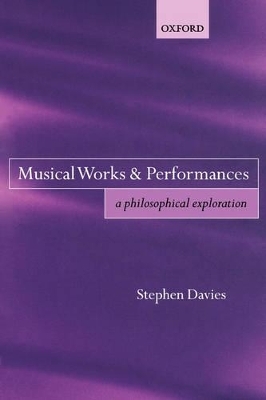
Musical Works and Performances
A Philosophical Exploration
Seiten
2004
Oxford University Press (Verlag)
978-0-19-927411-6 (ISBN)
Oxford University Press (Verlag)
978-0-19-927411-6 (ISBN)
Stephen Davies presents an exploration of the nature of musical works, their performances, and the ways in which they are notated. He argues that works come in a variety of types, and discusses such questions as whether it is possible to perform old music authentically, the relations between recordings and live performances, and more.
What are musical works? Are they discovered or created? Of what elements are they comprised? How are they specified by notations? What makes a performance of one piece and not another? Is it possible to perform old music authentically? Can ethnic music influenced by foreign sources and presented to tourists genuinely reflect the culture's musical and wider values? Can recordings substitute faithfully for live performances? These are the questions considered in Musical Works and Performances.
Part One outlines the nature of musical works, their relation to performances, and their notational specification. Works for performance differ from ones that are merely for playback, and pieces for live rendition are unlike those for studio performance. Pieces vary in the number and kind of their constitutive properties. The identity of musical works goes beyond their sonic profile and depends on their music-historical context. To be of a given work, a performance must match its contents by following instructions traceable to its creation. Some pieces are indicated via exemplars, but many are specified notationally. Scores must be interpreted in light of notational conventions and performance practices they assume.
Part Two considers authenticity in performance, musical traditions, and recordings. A performance should follow the composer's instructions. Departures from the ideal are tolerable, but faithfulness is central to the enterprise of work performance, not merely an interpretative option. When musical cultures interact, assimilation from within differs from destruction from without. Even music subject to foreign influences can genuinely reflect the musical traditions and social values of a culture, however. Finally, while most works are for live performance, most performances are experienced via recordings, which have their own, distinctive characteristics.
This comprehensive and original analysis of musical ontology discusses many kinds of music, and applies its conclusions to issues as diverse as the authentic performance movement, the cultural integrity of ethnic music, and the implications of the dominance of recorded over live music.
What are musical works? Are they discovered or created? Of what elements are they comprised? How are they specified by notations? What makes a performance of one piece and not another? Is it possible to perform old music authentically? Can ethnic music influenced by foreign sources and presented to tourists genuinely reflect the culture's musical and wider values? Can recordings substitute faithfully for live performances? These are the questions considered in Musical Works and Performances.
Part One outlines the nature of musical works, their relation to performances, and their notational specification. Works for performance differ from ones that are merely for playback, and pieces for live rendition are unlike those for studio performance. Pieces vary in the number and kind of their constitutive properties. The identity of musical works goes beyond their sonic profile and depends on their music-historical context. To be of a given work, a performance must match its contents by following instructions traceable to its creation. Some pieces are indicated via exemplars, but many are specified notationally. Scores must be interpreted in light of notational conventions and performance practices they assume.
Part Two considers authenticity in performance, musical traditions, and recordings. A performance should follow the composer's instructions. Departures from the ideal are tolerable, but faithfulness is central to the enterprise of work performance, not merely an interpretative option. When musical cultures interact, assimilation from within differs from destruction from without. Even music subject to foreign influences can genuinely reflect the musical traditions and social values of a culture, however. Finally, while most works are for live performance, most performances are experienced via recordings, which have their own, distinctive characteristics.
This comprehensive and original analysis of musical ontology discusses many kinds of music, and applies its conclusions to issues as diverse as the authentic performance movement, the cultural integrity of ethnic music, and the implications of the dominance of recorded over live music.
Stephen Davies teaches philosophy at the University of Auckland.
PART ONE: WORKS, THEIR INSTANCES, AND NOTATIONS ; PART TWO: PERFORMANCE, CULTURE, AND RECORDING
| Erscheint lt. Verlag | 1.9.2004 |
|---|---|
| Zusatzinfo | numerous musical examples and line drawings |
| Verlagsort | Oxford |
| Sprache | englisch |
| Maße | 155 x 235 mm |
| Gewicht | 526 g |
| Themenwelt | Kunst / Musik / Theater ► Allgemeines / Lexika |
| Kunst / Musik / Theater ► Musik ► Klassik / Oper / Musical | |
| Kunst / Musik / Theater ► Musik ► Musiktheorie / Musiklehre | |
| Geisteswissenschaften ► Philosophie | |
| ISBN-10 | 0-19-927411-8 / 0199274118 |
| ISBN-13 | 978-0-19-927411-6 / 9780199274116 |
| Zustand | Neuware |
| Haben Sie eine Frage zum Produkt? |
Mehr entdecken
aus dem Bereich
aus dem Bereich
Buch | Softcover (2024)
Der Theaterverlag - Friedrich Berlin
CHF 48,95


